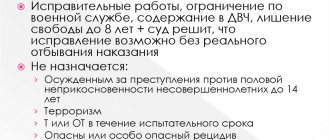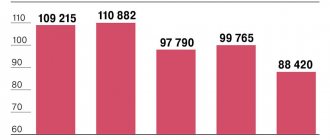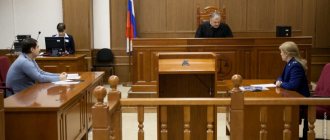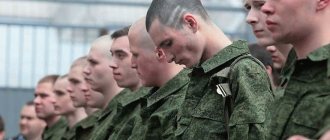What awaits the convicted person?
Having chosen a conditional correctional measure, a probationary period is assigned to the individual along with it.
A suspended sentence with a probationary period, what is it, what actions will the guilty person have to perform:
- visit an authorized institution in order to mark your presence in a certain territory. Where to register is usually determined by a court decision. In any case, upon appointment of a conviction, after about 2 weeks, the convict is notified by the inspector assigned to him about the time and place of the meeting, explains preferences and obligations, explains which department of the correctional inspection to come to and with what frequency;
- comply with assigned additional restrictions;
- try to prove your correction - get a job, get reinstated in your studies, and not commit offenses.
The probationary period varies and may be different depending on the expected actual sentence for the criminal act committed:
- From six months to 3 years (if this article provides for imprisonment for a period of up to 12 months or a milder punishment).
- Up to 5 years (if arrested for more than a year).
- For the entire time remaining until the end of military service (in the form of detention in a disciplinary unit).
The duration is fixed in court, taking into account all mitigating factors, the identity of the perpetrator, and the degree of damage caused. Time is calculated from the period when the court verdict comes into force. However, the period of time from the announcement of the imposed measure to the entry into force is counted towards the term of serving the sentence.
ATTENTION !!! Replacing an actual sentence with a suspended sentence does not prevent the imposition of additional sanctions. They are determined separately. However, their observance is precisely the result of correction.
An additional measure may include:
- prohibition of changing permanent place of residence, work, study;
- restrictions on visiting certain establishments (that can have a bad influence - nightclub, bar);
- obligation to undergo a treatment course (for those suffering from alcohol and drug addiction);
- responsibilities for employment and reinstatement in an educational institution.
The above list is not exhaustive and may be supplemented upon consideration by the court. Also, while being tested, it is allowed to add new measures and change the validity period. Again, what restrictions to apply will be decided by the judge at the request of the inspector (with good behavior, the regime as a whole may be relaxed).
Many individuals are interested in whether it is possible to travel abroad while on probation. As a rule, these are mutually exclusive actions, since the most common additional measure is a restriction on the permitted territory for movement (within a region - region, district).
○ What is a criminal record?
This concept is disclosed in the Criminal Code of the Russian Federation.
A person convicted of committing a crime is considered to have a criminal record from the day the court’s conviction enters into legal force until the criminal record is expunged or removed. A criminal record in accordance with this Code is taken into account in case of recidivism of crimes, imposition of punishment and entails other legal consequences in cases and in the manner established by federal laws (Clause 1 of Article 86 of the Criminal Code of the Russian Federation).
In accordance with this law, this is a temporary status of a citizen, which is assigned to him until the end of the probationary period appointed by the court. Despite the fact that many believe that a criminal record is a lifelong stigma, in fact, after expungement, it only affects public assessment.
Carrying punishment
The punishment is served at the place of permanent residence of the convicted person. The latter undertakes to register with the local branch of the executive inspection and visit an authorized person to register with a regularity established in advance (from 1 to 4 times a month).
ATTENTION !!! The generally accepted procedure for serving a sentence is fixed in Art. 118 of the Penal Code of the Russian Federation, also determined by a court decision. Institutions keep records of the culprits, monitor behavior and monitor the implementation of additional enforcement measures (for example, there is a ban on leaving the home from 22:00 to 6:00. During this time, the inspector has the right to visit the individual’s home in order to check his presence at home. Moreover, these actions are carried out without advance warning from the employee).
If a person avoids meeting with an employee, visits the institution irregularly or not at all, or does not comply with prescribed restrictions, then, upon the proposal of the inspector, new legal proceedings are initiated. Upon its completion, a decision is made to tighten enforcement measures, namely, the application of a real deadline.
Serving probation
The suspended sentence is served at the place of permanent residence . The convicted person must register with the local penal inspection and regularly visit the inspector. Where to report for a suspended sentence - this question can be clarified on the website of your regional Federal Penitentiary Service, finding there a list, addresses, and work schedule of penal inspections. As a rule, they operate at the local (city, district) level, some at the inter-district level.
The procedure for serving a suspended sentence is determined by the court, as well as Art. 188 Penal Code of the Russian Federation. The correctional institutes keep personal records of convicts, monitor their behavior and fulfillment of the duties imposed by the court. Convicts are required to appear when called by the inspector, attend inspections, report to the inspector about their behavior, and compensate for the damage caused by the crime, which is determined by the sentence. The frequency of marks may be established by the court. If this has not been done, the schedule is determined by the inspector. The convicted person is obliged to comply with it. If he does not show up for the appointment, measures will be taken to establish his whereabouts, determine the reasons for his failure to appear, and, possibly, bring him to justice.
Violation of established duties by a convicted person for the first time entails a written warning. Further, it is possible to cancel the suspended sentence.
Control is removed as soon as the probationary period has expired.
Our lawyers know the answer to your question
Free legal advice by phone: in Moscow and the Moscow region, in St. Petersburg, as well as throughout Russia
This type of liability may be assigned subject to certain conditions:
- The liquidation of freedom for more than 8 years is not considered to be actual repression. The article requires corrective labor, restrictions on military service, and stay in a disciplinary unit.
- The culprit is not subject to prohibitions that do not allow choosing a conditional sentence (committing a crime against the sexual integrity of a minor, terrorism (Article 205.1, 205.2, 205.4), hostage taking (Parts 1-3 of Article 206), attack on an organization or person under the auspices of international protection (Article 360); commission of a criminal act of a grave or especially grave nature during the probation period for a previous offense; recidivism posing a particular danger to society).
- The degree of danger to society, the personality of the defendant, mitigating and aggravating circumstances make it possible to assign a condition (the factor of the primacy of the commission of the crime, repentance and admission of guilt, characteristics of the person from the place of employment or educational institution, the presence of a family and dependents, raising young children, being pregnant) are taken into account.
IMPORTANT !!! As judicial practice shows, judges willingly choose the commented type of suppression in the presence of mitigating circumstances and a positive characteristic of the culprit. However, if there is at least one aggravating factor, the court may reject any attempts to impose a more humane measure of correction.
The procedure for assigning a suspended sentence
Conditional sentencing is the right of the court, but only in the manner and in cases provided for by the Criminal Code of the Russian Federation. The basis for this is to establish the possibility of correcting a convicted person without applying real punishment.
The set of conditions under which a suspended sentence may be imposed:
- As a real punishment, the court decided to impose imprisonment for up to 8 years, correctional labor, restrictions on military service, or detention in a disciplinary unit.
- The convicted person is not subject to restrictions for probation, which are:
- committing a sexual offense against a minor (under 14 years of age);
- committing a crime under Part. 1 and 2 tbsp. 205.1, Art. 205.2, part 2 art. 205.4 (terrorism), part. 1-3 Article 206 (hostage taking), Art. 360 of the Criminal Code of the Russian Federation (attack on persons and organizations under international protection);
- committing a serious or especially serious crime during the probationary period of a previously assigned conditional sentence for any intentional crime;
- committing a serious or especially serious crime during the unserved part of the sentence for an intentional crime while on parole;
- dangerous/especially dangerous relapse.
- The nature and degree of danger of the crime committed, the identity of the convicted person, and the mitigating and aggravating circumstances available in the case allow the application of a conditional sentence (evaluation criterion).
As a rule, the court goes for a conditional sentence if there are no restrictions for this, and the convicted person has a positive character, has made amends for the cause of harm and has other mitigating circumstances. On the other hand, even one aggravating circumstance is enough to prevent the court from agreeing to this. In general, too many evaluative factors, and sometimes subjective assessments, underlie the court’s adoption of a particular decision. In the vast majority of cases, those defendants who face real imprisonment are fighting for a suspended sentence.
The decision on a suspended sentence is made by the court along with the decision of other issues when preparing a guilty verdict. It is included in the text of the sentence and announced along with it.
Cancellation of probation
A suspended sentence may be revoked in two situations:
- Upon correction of the face.
- To replace it with a more severe punishment.
In both the first and second cases, the initiator of the start of the process is an employee of the executive inspection.
Thus, early revocation of punishment is provided as an incentive measure for:
- completing more than half of the trial period;
- the convict managed to convince the employees of his correction, he made amends for the damage caused, at least partially.
At the same time, the issue of expunging a criminal record is resolved.
In the second case, not everything is so positive.
Changing the sanction to a more stringent type of sanctions, namely the actual period, is assumed if:
- Systematic evasion of compensation for harm caused.
- Regular violation of the regulations and restrictions established for him.
- Constant violation of public order and administrative liability during the probationary period.
- Avoiding meetings with an employee, escaping from the designated area.
- The individual committed a deliberate crime with grave consequences for the victim.
Conditional sentence, grounds and procedure for its revocation or extension of probation
A conditional conviction means that the court, when passing a guilty verdict and assigning a specific type of punishment to the convicted person, determining its term, decides to consider the imposed punishment suspended, i.e. does not carry it out under the condition that the convicted person fulfills certain requirements.
A suspended sentence can only be applied when imposing punishments in the form of correctional labor, restrictions on military service, detention in a disciplinary military unit or imprisonment for a term of no more than 8 years.
The condition for the application of a suspended sentence is the possibility established by the court of correcting the convicted person without actually serving the assigned sentence, taking into account the nature and degree of social danger of the crime committed, the identity of the perpetrator, as well as mitigating and aggravating circumstances.
In the case of a suspended sentence, two terms are indicated in the guilty verdict: the sentence period and the probationary period.
A probationary period is a control period of time during which the convicted person must prove his correction by his behavior.
When imposing a sentence of imprisonment for a term of up to 1 year or a more lenient punishment, the probationary period must be at least 6 months and no more than 3 years, and in the case of imposing imprisonment for a term of more than 1 year - at least 6 months and not more than 5 years.
If a sentence is imposed and served in a disciplinary military unit, the conditional probationary period is established within the limits of the remaining period of military service on the day the verdict is announced.
The probationary period is calculated from the moment the sentence enters into legal force. The probationary period includes the time elapsed from the date of pronouncement of the sentence.
With a suspended sentence, any additional types of punishment that are actually executed can be imposed.
The court may impose the following duties on a conditionally convicted person:
- do not change your permanent place of residence, work, or study without notifying the Penitentiary Inspectorate;
- do not visit certain places;
— undergo treatment for alcoholism, drug addiction, substance abuse or a sexually transmitted disease;
- work (get a job) or continue studying in a general education organization.
The court may impose on the conditionally convicted person the performance of other duties that contribute to his correction, as well as oblige him to eliminate the property damage caused by the crime, provide financial support to the family, etc.
Control over the behavior of conditionally convicted persons during the probationary period is carried out by the penal inspections at the place of residence, and in relation to conditionally convicted military personnel - by the command of military units.
The behavior of suspended minors is controlled by the juvenile affairs inspectorate.
It depends on the behavior of the conditionally convicted person during the probationary period and his attitude towards the duties assigned to him whether these duties will be completely or partially canceled or supplemented by new ones by the court, on the proposal of the body exercising control over the behavior of the convicted person.
After the expiration of the probationary period, if the probationer complies with the instructions of the court sentence, his conviction for this crime is expunged.
The Criminal Code of the Russian Federation, as an incentive measure, provides for the possibility of early cancellation by the court of a suspended sentence with the removal of a convicted person’s criminal record, subject to the following conditions:
- correction of a conditionally convicted person before the expiration of the probationary period (this may be evidenced by a conscientious attitude to the performance of the duties assigned by the court during the probationary period; his employment, non-commitment of offenses, maintenance of public order, etc.);
- expiration of at least half of the probationary period established by the sentence;
- compensation for damage caused by the crime.
Extension of the probationary period is possible in the following cases:
- evasion of the duties assigned to the convicted person;
— violation of public order for which the person was brought to administrative responsibility;
- evasion of compensation for damage caused by a crime.
The probationary period established by the sentence may be extended by no more than 1 year. The law does not provide for a repeated extension of the probationary period.
Cancellation of a suspended sentence, provided for as a penalty, means turning to the actual execution of the suspended sentence for:
- systematic violation of public order, for which the conditionally convicted person was brought to administrative responsibility;
- systematic failure to fulfill the duties assigned to him by the court;
— the fact of concealment of the conditionally convicted person from control;
- commission of a crime of minor or moderate gravity during the probationary period;
- commission of a serious or especially serious crime during the probationary period.
If a person commits a new crime and the suspended sentence is revoked, the punishment is imposed based on the totality of sentences to the punishment imposed for the new crime, the court fully or partially adds the previously imposed punishment.
Start of activity (date): 06/09/2018 14:50:12
Consequences of conviction
No matter how mild and humane the way to correct a person who has broken the law is a suspended sentence, it is still a criminal record. The consequences of being held accountable will haunt the individual for life.
So, what does the future threaten:
- according to the provisions of Article 32 of the Constitution of the Russian Federation, suspended sentenced persons do not have the right to nominate themselves for a position in the legislative body of the state at any level;
- according to the requirements of the Federal Law “On the procedure for leaving the Russian Federation”, an individual who is on probation, until the expiration of its term and the removal of a criminal record in all systems, has no right to leave the territory of the country;
- seeming formal difficulties in applying and finding employment. Thus, a previously convicted subject will never be able to serve in law enforcement agencies or the judicial system. There are also a number of restrictions for civil servants. They will be denied jobs that require an unquestioning reputation that sets an example - teachers, educators, additional education workers. Also, many large companies refuse to employ such persons (formally another reason for refusal is stated, but in reality it is a fact of criminal behavior).
IMPORTANT !!! Thus, those who consider the presence of a suspended sentence to be no limiting factor for themselves are greatly mistaken. What is in fact: the measure of influence is really milder than staying in a colony; the individual remains free. The way of everyday life is practically not transformed, with the exception of the appearance of an obligation to mark and the operation of an additional measure.
However, a conviction is still a criminal record. Subsequently, this fact will certainly affect a person’s life. First of all, as with any other measures of influence, the individual’s reputation suffers. The person will be punished, the criminal record will be expunged, but the gap in reputation will not be filled. Therefore, the position that the way of life has not changed in any way and that a correction has taken place and that the presence of condemnation will not be reflected in the future is erroneous and unconscious.











